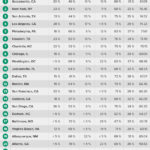By Lizzy McLellan
The American Lawyer, August 29, 2017 —
Sometimes it’s not just where you work that affects your happiness on the job. Female and minority midlevel associates reported slightly lower job satisfaction and different career expectations.
Female associates gave their workplaces an overall rating of 4.34, on average, while male midlevels averaged 4.43. The difference in satisfaction between minority and white associates was less pronounced. White midlevels gave their firms an average score of 4.41, while minority levels rated their firm a 4.36.

Photographer: Hongqi Zhang (aka Michael Zhang and michaeljung)
When it came to mulling the future, the differences between genders, and between white and minority associates, were starker.
While 62 percent of white associates said that they consider themselves to be on the partner track, just 54 percent of minority associates said so. Some 16 percent of minority midlevels said that they are not on the partner track, compared to 12 percent of white associates. And more minority associates reported uncertainty about their status, with 30 percent saying they are not sure if they’re on the partnership track, versus 25 percent of white associates.
Asked where they’d like to be in five years, just 13 percent of women said they want to be an equity partner at their current firm, compared to 23 percent of male associates. Roughly equal proportions of male and female midlevels—10 percent of women and 11 percent of men—were interested in being nonequity partners. A quarter of women—25 percent—said they don’t know where they want to be in five years, while 19 percent of men expressed the same uncertainty.
Among minority associates, 16 percent said they hope to be an equity partner at their current firm in five years, and 9 percent want to be nonequity partners. Of the white respondents, 20 percent aim to be equity partners in five years, and 11 percent nonequity partners.
Many survey respondents noted that industry-wide problems, rather than individual firm conditions, take away from their job satisfaction. Those issues included lack of diversity, work-life balance and accommodation for parents.
2017 Midlevel Associate Survey










